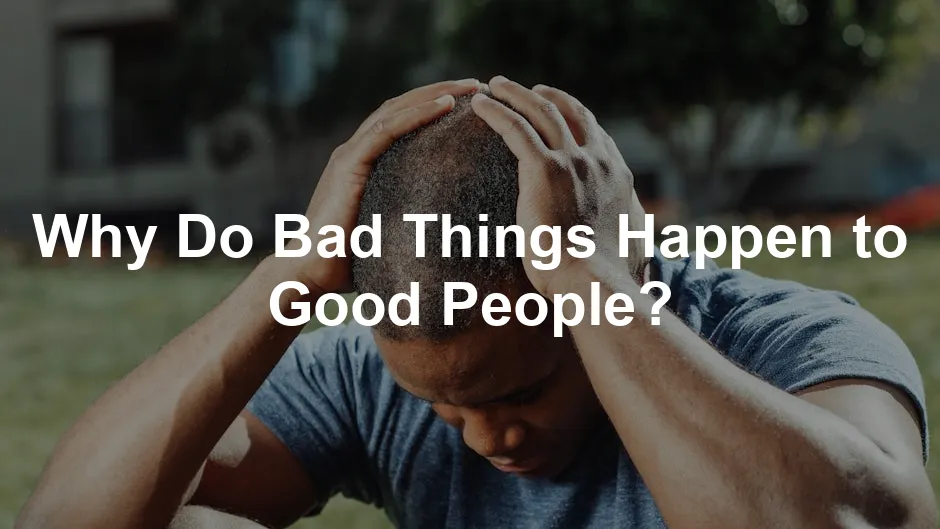
Why Do Bad Things Happen to Good People?
Introduction
Suffering is a universal experience that touches everyone. It raises questions about fairness, especially when good people face profound hardships. Why do the kindest among us endure such pain? Let’s explore various perspectives on this complex issue.
Summary and Overview
Understanding why bad things happen, especially to good people, is crucial for personal growth. This article examines different themes, including psychological, theological, and philosophical viewpoints. From the struggle of faith to the quest for meaning, we uncover insights that help us navigate suffering. By exploring these perspectives, we can better understand the nature of suffering and its role in our lives. Through this exploration, we aim to provide comfort and clarity when faced with life’s challenges.
If you’re looking for a deeper understanding of suffering, consider picking up The Book of Job. This classic literature piece dives into the depths of suffering and faith, providing timeless insights that resonate with many.
Understanding Life’s Unfairness
The Cultural Assumption
Many people believe that good actions should lead to positive outcomes. This cultural narrative suggests that a moral life will protect us from suffering. However, reality often contradicts this notion. For instance, studies show that individuals often perceive unfairness in life, especially when witnessing good people suffer unjustly.
People frequently ask, “Why do bad things happen to me?” This question reflects our deep-seated belief in a just world. Cultural narratives reinforce the idea that goodness should yield good fortune. When life challenges this belief, it can lead to confusion and frustration. For example, consider individuals who devote their lives to helping others yet face devastating losses. Their experiences challenge our assumptions about fairness.
In this context, we must confront the uncomfortable truth: suffering does not discriminate. It can affect anyone, regardless of their character or intentions. Acknowledging this reality can be liberating. It allows us to accept that life is not always fair, and that suffering is part of the human experience. By understanding these cultural expectations, we can begin to navigate our pain with greater resilience.

The Nature of Suffering
Suffering is a profound aspect of the human journey. It differs from pain, which is a physical sensation. Pain is temporary and can often be treated, while suffering often lingers in our emotional and mental state. It encompasses feelings of loss, despair, and helplessness.
Suffering is an inevitable part of life. Everyone experiences it at some point. Think about moments when you faced challenges—perhaps the loss of a loved one or a severe setback at work. These experiences shape us, often leading to personal growth.
Philosophers have long pondered the reason for suffering. Some suggest it’s essential for our development. In a world that can seem chaotic and unfair, suffering serves as a reminder of our shared humanity. When we acknowledge our own suffering, we can better empathize with others. This connection may lead to a deeper understanding of life itself, fostering compassion and resilience in the face of adversity.
Ultimately, suffering can be a catalyst for change, pushing us to seek meaning and connection in our lives.

Lessons from the Book of Job
The Book of Job is a powerful narrative that addresses suffering and faith. Job, a righteous man, faced unimaginable trials. His wealth, health, and family were taken away, leaving him in despair. Despite this, he maintained his faith in God, famously declaring, “Though he slay me, yet will I hope in him.”
Job’s story highlights the struggle between faith and suffering. It teaches us that suffering does not always have a clear purpose. Instead, it can be a test of resilience and a means to deepen our faith. The moral lessons from Job emphasize that life’s trials can lead to greater spiritual understanding.
Ultimately, Job’s unwavering faith serves as a reminder that even in our darkest times, we can find strength and purpose. His experience encourages us to hold on to hope, even when life feels overwhelmingly unfair. In this way, Job’s journey offers profound insights into the nature of suffering and the human spirit’s capacity to endure.
Psychological Insights
Coping Mechanisms
Coping with suffering is a deeply personal journey. Each individual has unique strategies to navigate life’s challenges. Common coping mechanisms include seeking support from friends and family, practicing mindfulness, and engaging in creative outlets.
If you’re feeling overwhelmed, consider using a Journal for Gratitude and Reflection. Writing down your thoughts can help you process your emotions and cultivate a positive mindset.
Research shows that resilience plays a crucial role in how we handle adversity. Studies indicate that those who maintain a positive outlook tend to recover more quickly from hardship. Finding meaning in suffering can also be transformative. Many individuals discover purpose by helping others or reflecting on their experiences.
Support systems are vital. Talking about feelings can lighten emotional burdens. Additionally, professional help, like therapy, can provide valuable tools for coping. By understanding our reactions to suffering, we can foster resilience and develop healthier coping strategies. Life’s difficulties might be unavoidable, but how we respond can shape our path towards healing and growth.

The Illusion of Control
We all have a deep psychological need to feel in control. It’s a comforting belief that our actions dictate our outcomes. When bad things happen, especially to good people, this illusion can shatter. We often ask, “What did I do to deserve this?” This question stems from our desire for order in a chaotic world.
Life, however, is riddled with randomness. Events unfold unexpectedly and can leave us feeling helpless. Think about how often you’ve seen good people face unfair challenges. It’s disheartening, isn’t it? This randomness can trigger feelings of anxiety and despair. We grapple to find reasons where none might exist.
Understanding this randomness helps us cope better. Instead of clinging to the idea that we control everything, we can accept life’s unpredictability. This acceptance fosters resilience. It encourages us to respond to suffering with grace and strength. By acknowledging that bad things can happen to anyone, we can focus on what we can control: our reactions and attitudes. This shift in perspective can empower us to navigate life’s challenges more effectively.

Finding Meaning and Purpose
Personal Growth through Adversity
Suffering can be a powerful catalyst for personal growth. Many individuals find that hardships lead them to transformative experiences. For instance, consider someone who loses a job. Initially, this might feel devastating. Yet, it often prompts them to pursue their passions or start anew. This journey can uncover hidden strengths.
Take the story of J.K. Rowling, for example. Before her success with Harry Potter, she faced numerous rejections and personal struggles. Those challenges fueled her creativity, ultimately leading to her breakthrough. Her journey illustrates how adversity can shape our paths in unexpected ways.
Moreover, suffering can instill resilience. When faced with obstacles, we learn to adapt and persevere. These experiences often foster empathy, making us more attuned to the struggles of others. In these moments, we discover purpose. By embracing our challenges, we can transform pain into a stepping stone for personal growth and deeper connections with those around us.

Acts of Kindness and Community
Kindness and community support play vital roles in overcoming life’s challenges. When adversity strikes, having a supportive network can make all the difference. Imagine facing a tough situation alone; the weight can feel unbearable. Now picture friends and family rallying around you, offering help and encouragement. This sense of belonging can provide a lifeline during dark times.
Helping others can also bring immense meaning to our lives. Engaging in acts of kindness not only benefits those in need but also boosts our own well-being. Research shows that altruism can lead to increased happiness and reduced stress. When we extend a hand to someone else, we create a ripple effect of positivity. It’s a reminder that even amidst suffering, we can find purpose through connection.
Community support fosters resilience. When we share our burdens, they become lighter. This collective strength can help us navigate hardships and emerge stronger. Together, we can transform our pain into compassion, making the world a better place for everyone. Embracing kindness and community can be a powerful antidote to adversity.

To enhance your relaxation journey, you might want to explore a Weighted Blanket for Anxiety and Stress Relief. It provides comfort and can help you sleep better through challenging times.
Please let us know what you think about our content by leaving a comment down below!
Thank you for reading till here 🙂
All images from Pexels




